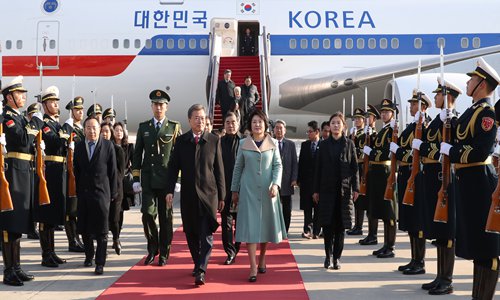
South Korean President Moon Jae-in arrives with his wife on Wednesday in Beijing as he starts a four-day visit to China. Photo: VCG
South Korean President Moon Jae-in Wednesday stressed the shared sorrow of the two countries during World War II as he began his State visit to China to restore bilateral ties and boost trade.
At a meeting with some 400 South Korean residents in Beijing, Moon said that China and South Korea "have been together through a long history. When China prospered, South Korea prospered, too, and when China failed, South Korea also failed … The two countries together faced the difficulties of imperialism and together fought against Japanese colonial rule," the Yonhap News Agency reported on Wednesday.
"Moon paid his respects to the Chinese people and emphasized the shared experience of being occupied by Japan. He may also imply that South Korea would not enter into the trilateral military alliance with the US and Japan considering its people's feelings," Zhang Huizhi, a professor at Jilin University's Northeast Asian Studies College, told the Global Times.
Zhang also said Moon showed sincerity by sending Noh Young-min, South Korean ambassador to China, to attend the memorial event for the victims of the Nanjing Massacre in Nanjing, East China's Jiangsu Province on Wednesday instead of welcoming the president at the airport in Beijing.
"Moon has also paid greater attention to economic and trade exchanges during his visit as they have been affected after South Korea announced the deployment of the Terminal High Altitude Area Defense (THAAD)," Cui Zhiying, director of Tongji University's Korean Peninsula Research Center, told the Global Times on Wednesday.
"South Korea's economy relies heavily on the overseas market. The huge Chinese market is alluring for South Korea as it has difficulty exploring more markets in Europe and the US amid protectionism in the regions," Cui said, adding that South Korea also wants to take part in China's Belt and Road initiative.
Top executives from dozens of leading South Korean firms are accompanying the president on his first trip to China. Some of the top executives represent Samsung, Hyundai Motor, LG, SK and Hanwha groups, Yonhap reported.
Aside from exchanges on trade and investment, the South Korean government also made efforts to enhance people-to-people exchanges.
Reaching out
South Korea's Ministry of Culture, Sports and Tourism, the Korean Cultural Center in China and the website thepoemforyou.com jointly started a program for South Korean celebrities to read the country's poems online.
The Korean Cultural Center told the Global Times that Moon's wife, Kim Jung-sook, also attended the event and read the poem, "Visitor," on Wednesday.
The center confirmed that Kim chose the poem for the friendship between China and South Korea. "The friendship began a long time ago and will last. So, too, will their ties. Only when we treat each other with sincerity can we jointly step into the future," Kim said.
Other guests invited by the poem reading program include Do Jong-whan, minister of the Ministry of Culture, Sports and Tourism, Lee Chang-ho, a South Korean professional Go player, Ko Un, a South Korean poet, and Choo Ja-hyun, a South Korean actress married to a Chinese actor.
"The South Korean government hopes to narrow the gap with the Chinese by inviting South Korean celebrities popular with Chinese as the deployment of the THAAD has aroused antipathy among some Chinese people," Li Dunqiu, an expert of the Korean Peninsula issue at the Chinese Academy of Social Sciences, told the Global Times.
Li said that Sino-South Korean mutual trust could be enhanced by more people-to-people exchanges but the THAAD issue remains a ticking time bomb, which could hurt bilateral ties at any time.


